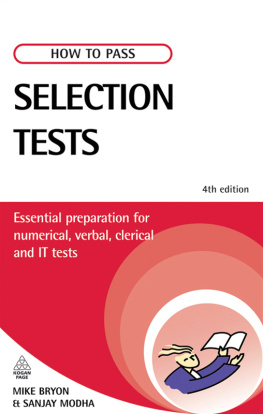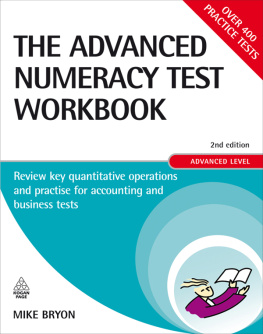Perfect
Psychometric Test Results
Joanna Moutafi
Ian Newcombe
Sean Keeley
Mark Abrahams
Sarah Mortenson
Dunstan Arthur
About the Authors
Kenexa is a global human capital management firm which helps organizations recruit and retain talented people. Kenexa solutions include a wide range of psychometric and skills assessments, applicant tracking, employment process outsourcing, phone screening, structured interviews, performance management, multi-rater feedback surveys, employee engagement surveys and HR Analytics.
The books authors are all employees within the Kenexa Assessment practice, based in London. Between them they have over 50 years of experience designing and analysing psychometric assessments across a wide range of industry sectors and for a range of applications such as selection, development and career counselling.
This book was written by
Dr Joanna Moutafi, C. Psychol.
Ian Newcombe, C. Psychol., AFBPsS
Sean Keeley, C. Psychol.
Mark Abrahams, MSc
Sarah Mortenson, MSc
Dunstan Arthur, MSc
Other titles in the Perfect series
Perfect Answers to Interview Questions Max Eggert
Perfect Babies Names Rosalind Fergusson
Perfect Best Man George Davidson
Perfect CV Max Eggert
Perfect Interview Max Eggert
Perfect Numerical Test Results Joanna Moutafi and Ian Newcombe
Perfect Personality Profiles Helen Baron
Perfect Pub Quiz David Pickering
Perfect Punctuation Stephen Curtis
Perfect Readings for Weddings Jonathan Law
Perfect Wedding Speeches and Toasts George Davidson
This eBook is copyright material and must not be copied, reproduced, transferred, distributed, leased, licensed or publicly performed or used in any way except as specifically permitted in writing by the publishers, as allowed under the terms and conditions under which it was purchased or as strictly permitted by applicable copyright law. Any unauthorised distribution or use of this text may be a direct infringement of the authors and publishers rights and those responsible may be liable in law accordingly.
Epub ISBN: 9781409063346
Version 1.0
www.randomhouse.co.uk
Published by Random House Books 2007
2 4 6 8 10 9 7 5 3 1
Copyright Kenexa 2005
The authors have asserted their right under the Copyright, Designs and Patents Act 1988 to be identified as the authors of this work
This book is sold subject to the condition that it shall not, by way of trade or otherwise, be lent, resold, hired out, or otherwise circulated without the publishers prior consent in any form of binding or cover other than that in which it is published and without a similar condition, including this condition, being imposed on the subsequent purchaser
First published in the United Kingdom in 2007 by
Random House Books
Random House Books
Random House, 20 Vauxhall Bridge Road,
London SW1V 2SA
www.randomhouse.co.uk
Addresses for companies within The Random House Group Limited can be found at: www.randomhouse.co.uk/offices.htm
The Random House Group Limited Reg. No. 954009
A CIP catalogue record for this book is available from the British Library
ISBN 9781905211678
The Random House Group Limited makes every effort to ensure that the papers used in its books are made from trees that have been legally sourced from well-managed and credibly certified forests. Our paper procurement policy can be found at: www.randomhouse.co.uk/paper.htm
Typeset by Palimpsest Book Production Limited, Grangemouth, Stirlingshire Printed and bound in Great Britain by CPI Bookmarque, Croydon CR0 4YY
Preface
If you are looking at this book you have probably been asked to take a psychometric test, perhaps as part of the recruitment process for a new job or perhaps as part of your companys internal training scheme. I have no doubt that you want to do your best, and the good news is that this book is specifically designed to help you. It contains everything you need to pass psychometric tests with flying colours.
The first section describes everything you need to know about what psychometric tests are and how you take them. It explains the different types of test and the sorts of conditions you should expect when the day comes. It also includes a section on online testing, which is being used more and more frequently. The next section gives you plenty of hints and tips about how to improve your performance, with advice on everything from calming your nerves to whether you should guess the answers. Finally, there are over 400 questions written by the expert team at Kenexa so that you can practise your skills and get used to the sorts of challenges you will face.
Once you have read this book you will:
Understand much more about psychometric tests.
Have a toolkit of techniques to help you through the process, from the moment you are invited to take a test to the testing day itself.
Have an in-depth knowledge of the key types of questions that form psychometric tests.
Have the confidence to complete any test to the best of your ability.
Psychometric tests are being used increasingly widely by employers, but with a bit of background knowledge and some practice, there is no reason you shouldnt perform to the very best of your abilities.
Table of Contents
Contents
Introduction to psychometric tests
What are psychometric tests?
Lets start at the beginning. What does the word psychometric really mean? It is derived from the Greek words psyche, meaning soul, and metron, meaning to measure. Strictly speaking, therefore, you might say that psychometric tests are tests that measure the soul, but in plain English, psychometric tests are instruments that measure in a structured way some characteristic of a persons ability or behaviour.
Types of psychometric test
There are two broad categories of psychometric test: tests of maximum performance and tests of typical performance. Organizations may use either or both categories of tests for selection decisions, as well as for employee development purposes, depending on the nature of the job. But of the different types of tests, the vast majority of organizations use two types: ability tests and personality questionnaires.
Tests of maximum performance
Tests of maximum performance are designed to measure the best performance that an individual can achieve in given circumstances. These are usually timed, and have right and wrong answers. Tests of maximum performance include ability tests and attainment tests.
Ability tests
For selection purposes, the most frequently used tests of maximum performance are ability tests. These can be tests of general mental ability, sometimes know as IQ tests, or of specific abilities, such as your ability in numerical, verbal, abstract or spatial reasoning. The main focus of this book is on the types of ability tests that you are most most likely to come across in your working life, and these are numerical reasoning tests, verbal reasoning tests and abstract reasoning tests.
Attainment tests
Attainment tests measure learning rather than ability. They can be on the same topic as ability tests for example, some numerical tests are ability tests, and some numerical tests are attainment tests. These two types of tests are linked by the fact that ability is required for learning, and some learning is required for ability.














